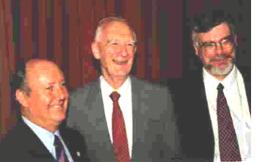NEICE Background
ARCHIVE WEBSITE
The Institute ceased its activity and the charity was dissolved at the end of April 2013
This is a copy of the NEICE website active at that date
NEICE Background
NEICE 1981 – 2013
ARCHIVE WEBSITE
The Institute ceased its activity and the charity was dissolved at the end of April 2013
This is a copy of the NEICE website active at that date
The North of England Institute for Christian Education was inaugurated on 18 October 1981. It was founded by the St Hild and St Bede Trust to create links, both at the theoretical and the practical level, between the Christian education activities of the churches and academic research in education, theology and religious studies within the academy.
During the early years of the Institute’s existence, NEICE’s work was mainly directed towards resourcing the practical work of Christian education, especially with adults. Much of its activity at this time was carried out in support of programmes of adult Christian education and initial and in-service ministerial and teacher education, especially in the Anglican Dioceses of Newcastle (e.g. the ‘Exploration in Faith’ programme) and Durham (e.g. Reader training), the St John’s College Extension Programme, the North East Ordination Course and the work of the ecumenical Theological Consultancy. NEICE itself successfully ran courses for the Cambridge Diploma and Certificate in Religious Studies for a number of years. A very large number of adult students, including clergy, were assisted by the Institute in their Christian reflection and formation during this period. Since 1983 NEICE has also hosted a study day for sixth-formers studying Religious Studies at Advanced Level.
More recently, the NEICE Management Committee, with the support of the Hild-Bede Trustees, has encouraged a re-direction of the Institute’s work that has created much more of a focus on the research and higher education dimensions of the Institute’s life. A wide range of (mostly local) collaborative action-research projects has now been successfully completed, and the staff and associates of the Institute have been active in publishing their own theoretical and empirical research.
To date, over 37,000 copies of NEICE-related books by staff and associates of NEICE have been sold through a number of different publishing houses in the UK, Continental Europe, the United States and Australia, in addition to the many volumes from other authors published in the four series co-edited by the Director. These publications have been well reviewed and there is good evidence that they are widely used in stimulating study and further research relating to Christian education in the churches and its educational institutions, religious education in schools, faith development, ordinary theology, preaching and other areas of practical theology, in addition to resourcing theological education at various levels with students and adult learners.
Theoretical research and teaching is often undertaken in association with the universities and colleges of the region. The Institute’s empirical research programme includes survey work closely focused on churches and schools in the North-East of England. Much of this work is undertaken in direct response to local requests, and often in collaboration with researchers in other institutions. The Institute has particularly close links with Durham University, especially through its Department of Theology and Religion and (in NEICE’s earlier years) its School of Education. The Director has helped to supervise a number of higher degree theses on Christian education topics. A summary of a NEICE survey into research needs in Christian education and religious education is available.
The Management Committee has always been clear that NEICE occupies a particularly valuable position at the interface between the academy and the church, as well as providing a unique forum for fruitful discussion and collaboration between the disciplines of theology and education. It is probably the only research institution in Britain whose primary concern is for the work of Christian formation and critical Christian education within the churches. Its independent, ecumenical nature adds to its distinctiveness. Nevertheless, NEICE’s broad mandate allows it to contribute to, and receive insights from, other contexts and studies of education in religion, as well as from relevant scholarship and research in theology, philosophy and the social sciences. Its close links within the North-East of England provide it with many opportunities for supportive consultancy work and empirical research at the local level.
From 1984 to 2007 the Institute’s offices were located in Carter House, Pelaw Leazes Lane, Durham City, a building owned by the Diocese of Durham but purchased by a grant from the Hild-Bede Trust given to secure accommodation for NEICE. In October 2007, the Institute moved from Carter House to premises in North Bailey, Durham City, owned by St Chad’s College.
Because of the curtailment of its main funding stream, the Institute ceased activity and the charity was dissolved at the end of April 2013, after nearly 32 years promoting Christian education research, publications and teaching.
Penultimate Annual Report and Final Report of NEICE’s Work.

